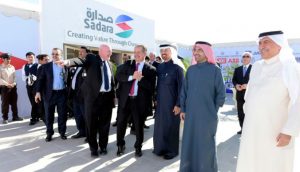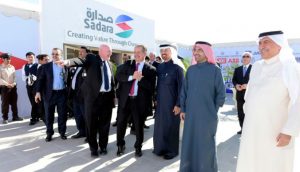Sadara epitomises rapid progress in Vision 2030 industrial cluster initiative
Saudi Arabia’s Sadara Chemical has become a key actor in the government’s strategy to develop downstream industries, create local jobs and diversify the country away from dependence on oil revenues. Sadara Chemical Company, the USD20bn Saudi Arabian petrochemicals joint venture in Jubail Industrial City between Saudi Aramco and Dow Chemical, which lies at the heart of the country’s industrial clusters programme, started up its fourth and final plastics plant in April – a high pressure low-density polyethylene (PE) train.
 The commissioning of the PE unit has coincided with the recent completion of the basic infrastructure phase of the associated PlasChem Park, a 12sqm downstream manufacturing facility. Construction work on its first downstream manufacturing unit has just started.
The commissioning of the PE unit has coincided with the recent completion of the basic infrastructure phase of the associated PlasChem Park, a 12sqm downstream manufacturing facility. Construction work on its first downstream manufacturing unit has just started.
The downstream park will be supplied with raw materials from Sadara’s 26 plants, many of them making products for the first time in the country, such as isocyanates, polyols, and certain elastomers, which will establish new value chains for the diversification of the country’s economy.
Recently announced planned projects at PlasChem, which Sadara is developing in partnership with the Royal Commission for Jubail and Yanbu (RCJY), include two by Saudi companies – one is Saudi National Automobile Manufacturing Company’s (SNAM) automotive cluster, and the other is Rufayah Chemicals Company’s (RCC) USD500m plant for making hydrocarbon resins.
Sadara, which was inaugurated in November last year, epitomises the accelerated progress being made in Saudi Arabia in establishing industrial clusters. These are at the core of the country’s Vision 2030 programme to replace imports, cut unemployment, and nurture new leadership and technical skills among Saudi Arabia’s young labour force in an economy no longer dependent on oil revenues.
PlasChem aims to attract not just Saudi but also foreign investors as well. “We have identified some unique opportunities with SMEs from the global market, with noticeable interest from Asian investors,” says Mohammad Alazzaz, director, Sadara’s Value Park department.
Saudi Aramco, the country’s state owned oil and gas company, which, with its growing petrochemicals interests, the government plans to turn into a global industrial conglomerate, has already had experience in industrial diversification at Rabigh in west Saudi Arabia. Here, the Petro Rabigh petrochemicals and refining complex joint venture between Saudi Aramco and Sumitomo Chemical of Japan is also linked to an expanding industrial plastics park.
At the national level, much of the task for laying the groundwork for diversification projects is being taken up by government departments, investment agencies and, in particular, organisations like the National Industrial Clusters Development Program (NICDP).
A crucial role is being played by the Ministry of Energy, Mineral Resources & Industry (MEIM), which since its creation last year with the introduction of Vision 2030 has become a super-ministry. It supervises oil, gas and petrochemicals, electricity and R&D, while it also runs training centers.
Responsibility for industrial sectors, including downstream manufacturing, was transferred to MEIM from the Ministry of Commerce and Industry, now renamed the Ministry of Commerce and Investment (MOCI). It took over the running of NICDP with MEIM minister Khalid Al- Falih becoming its chairman.
The Industrial Clusters programme, run by NICDP, now prioritizes the creation of clusters in the four sectors of automotive, plastics and packaging, pharmaceuticals and biotech, and minerals and metal processing. In all these it finds opportunities for companies with different levels of competences and skills.
Its tasks include the conducting of market research and provision of market data on specific projects; identifying the best possible locations, sites, suppliers and staff; and evaluating business model options, such as foreign direct investment, joint ventures and licensed operations.
It also has a strategic role in certain areas. These include filling gaps in Saudi Arabia’s petrochemical and plastics supply chains; expanding the number of plastics users, particularly in consumer packaged goods (CPG); attracting global plastics, packaging and CPG players; and encouraging more companies to adopt up-to-date licensed processes and technology.
In the automotive sector, NICDP signed in March a memorandum of understanding with Toyota of Japan, the market leader in the Arab Gulf car sector, for a feasibility study on the production of automobiles and parts in Saudi Arabia. The study would evaluate the potential for developing a local supply base using materials produced by major Saudi companies like SABIC and Petro Rabigh.



